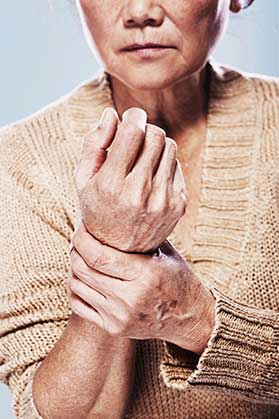Rheumatoid Arthritis Treatment in Crofton, MD

Rheumatoid Arthritis (RA) is a disease of the autoimmune system in which the body's immune system mistakenly attacks the body's joints. The body's immune system cells move into the body's joints and joint lining tissue and cause irritation that leads to swelling. This, in turn, wears down the body's cartilage (cushioning between the bones) and narrows the space between them. A fluid buildup within joints often results. Eventually, the breakdown of cartilage typically leads to bone erosion.
Rheumatoid Arthritis Prevalence
There are approximately 1.5 million people in the United States who suffer from rheumatoid arthritis. It is more prevalent in woman than men, with about three times more women than men reportedly struggling with RA. However, the symptoms are often more severe for men than for women.
Rheumatoid arthritis can begin anytime between the ages of 30 - 60, and is considered to be hereditary. There are also instances of people contracting RA without a family history. It is also possible for children to have RA.
Rheumatoid Arthritis Symptoms
Rheumatoid arthritis isn't consistent in the way it affects people. Some people experience a sudden onset of symptoms while others experience gradual intensification over years. The most common symptoms of RA include:
- Painful joints, swelling and redness
- Stiffness upon waking in the morning or after sitting for long periods of time throughout the day
- Rheumatoid nodules
- Weariness
Rheumatoid Arthritis Diagnosis
Your healthcare provider will conduct a physical examination by reviewing your medical history, reviewing your symptoms and checking for joint swelling. Your healthcare provider may also choose to conduct a blood test and x-ray.
Blood Test
A blood test will reveal an item called a rheumatoid-factor antibody (RF antibody), which is present in most people who have RA.
X-Ray
An x-ray will reveal osteoarthritis, which will typically be characterized by uneven cartilage loss, underlying bone spurs and bone damage. These changes often show up in a person's feet first, so your healthcare provider may want to x-ray your feet even if you do not initially report a problem with them.
Most healthcare providers will draw their conclusion based on the location of the painful swelling (especially if it involves the hands), when the swelling and pain are most intense, the results from x-rays and blood tests and whether or not there are any bumps or nodules under the skin.
Rheumatoid Arthritis Treatment
The earlier a diagnosis is made and treatment begins, the better the results will be. There are multiple treatment options available to help reduce the severity of symptoms including both traditional and alternative treatments. These options include:
- NSAIDs including aspirin and ibuprofen
- Physical therapy
- Dietary supplements including flaxseed and fish oils
- Hot and cold packs
- Corticosteroid medications
- Disease-modifying anti-rheumatic drugs
- Tai chi
- Acupuncture
In some cases, your healthcare provider may recommend surgery to correct severe joint damage. Your healthcare provider will discuss the treatment options available to you in order to produce the most impactful results.
Request more information about rheumatoid arthritis today. Call (410) 266-3613 or contact Annapolis Integrative Medicine online.
Annapolis Integrative Medicine
Address
1819 Bay Ridge AveSuite 180
Annapolis, MD 21403
(410) 266-3613
www.annapolisintegrativemedicine.com

